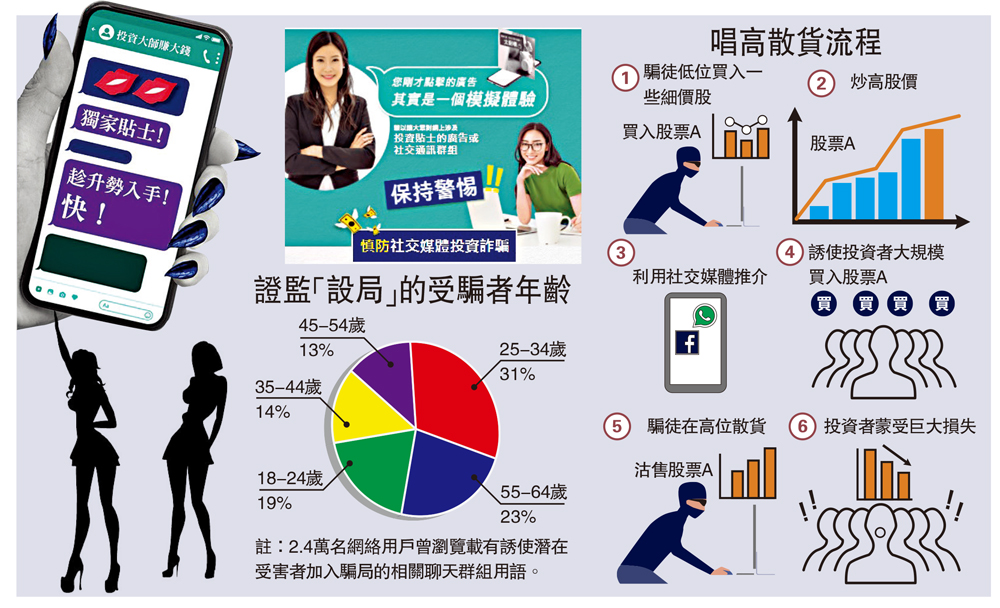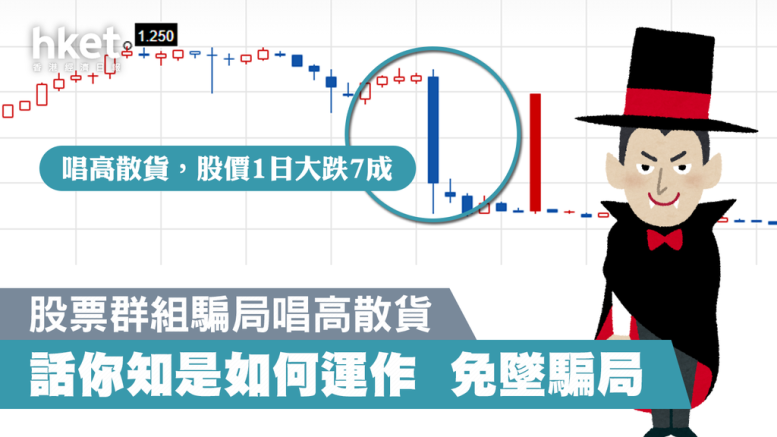今日盈透证券给其客户发送警示邮件,让客户小心“唱高散货”类骗局。

什么是“唱高散货”骗局?
“唱高散货”骗局属于操纵股票市场的手法之一。骗徒将股票的价格人为地推高,并利用社交媒体诱使不虞有诈的投资者,以高价买入有关股票,然后骗徒便卖出或抛售有关股票图利,导致股价下跌。
一般来说,这些骗局通常分三个阶段进行,首先挟仓并推高股价,再出货及抛售。首先,骗徒通常会拣选一些市值小、市场流通量低,以及股权高度集中的上市公司作为目标,因为这些股票相对较容易被操纵,而且操纵成本亦较低。骗徒会利用多个代名人账户买入该公司的大部分股票,即所谓的“挟仓”。一般来说,当骗徒透过挟仓和相关活动积极买入股票时,会带动股价大幅攀升。堕骗局后无法再联络骗徒第二阶段中,骗徒与同党串通,在受欢迎的社交媒体平台上散布有关该公司的利好(通常属虚假及具误导性)消息,从而将手上的股票沽出。骗徒以各种方法试图与投资者建立信任,借此引诱不虞有诈的投资者买入股票。股价在这阶段可能会上升或相对平稳,视乎骗徒的策略而定。最后,骗徒可能会抛售余下的所有股票,引致股价大跌;或者当他们再找不到投资者接货时,任何进一步的股票沽售,都会令股价大跌。堕入骗局的投资者通常事后都无法联络骗徒。
盈透证券所发的邮件内容如下:
亲爱的客户,
我们写信给您,想要通知您全球监管机构和执法机构,包括美国金融业监管局(FINRA)和香港证券及期货事务监察委员会(“证监会”),已经注意到一个日益增加的趋势,即投资者被骗子瞄准,试图通过操纵不知情的投资者购买某些公司的股票,最终使骗子获利,而投资者遭受巨大损失。这些骗局通常通过社交媒体实施。骗子努力建立信任关系(有时以友谊或浪漫的幌子,或声称他们是著名的投资顾问),并可能鼓励投资者加入社交媒体平台或聊天应用上的投资小组,其中会传播投资建议。然后,骗子告诉投资者根据他们所声称拥有的非公开信息或与公司或其管理层的联系,以高价购买特定公司的股票。通常,骗子会鼓励投资者购买市场流动性较低的小市值股票(包括“仙股” – 也即低价股,在美股市场则一般是指粉单股),这些股票更易于骗子操纵并以投资者的代价获利。当投资者跟随骗子的指示,无意中通过购买股票推高股价时,骗子便可以卖出他们自己的大量持股,这可能会大幅降低公司股价。这种类型的骗局被称为“拉抬和抛售”骗局。这可能导致投资者遭受巨大损失。
FINRA最近在一份名为《社交媒体“投资小组”冒名顶替骗局上升》的投资者警示中解释了这一趋势。香港证监会也在此链接发布了有关这些骗局的指南。有关更多来自投资者及金融教育委员会(IFEC)的例子,请点击这里:https://www.ifec.org.hk/web/sc/moneyessentials/scams/closer-look-investment-scams.page
我们鼓励您花时间阅读并理解以下关键点:
1、保持怀疑态度
在虚拟世界中,诈骗者可以轻易伪装自己。对你在网上遇到的任何人的身份保持怀疑,特别是如果他们声称是投资顾问或名人。当在线“朋友”提供未经请求的投资建议时,要特别警惕。
2、注意警示信号
以下是一些可能是骗局迹象的红旗,包括拉抬和抛售骗局:未经请求的投资建议。股票价格大幅上涨,而无关于公司的正面新闻。建议购买流动性低的小市值股票,特别是如果许多股份由小团体持有。你的在线“朋友”要求你发送交易记录的截图。
3、做好功课
这些骗局的操作者推荐的许多股票被高估,且没有明显的理由支持其价格飙升。强烈建议投资者在投资某公司前自行做好功课,或寻求持牌投资顾问的独立建议。
4、对听起来过于美好的投资保持警惕
如果一个投资听起来好得难以置信,那它往往是不真实的。请记住,不存在低风险且有高额保证回报的投资——这是骗子常用的手段,通过操纵人们害怕错失机会的恐惧来诱惑不警惕的投资者。
同时,请记住,盈透证券不提供投资建议。对任何声称提供投资建议的人保持警惕。
邮件英文原文:
Dear Client,
We are writing to you to let you know that global regulators and law enforcement agencies, including FINRA and the Hong Kong Securities and Futures Commission (“SFC”), have noted an increasing trend where investors are being targeted by scammers trying to manipulate unwary investors into purchasing stock in certain companies which ultimately result in profits for the scammer and large losses for the investor. These scams are often perpetrated via social media. The scammers work to establish a relationship of trust (sometimes under the pretext of friendship or romance, or a claim that they are a famous investment advisor) and may encourage the investor to join an investment group on a social media platform or chat app, where investment advice is disseminated. The scammers then tell the investor to purchase shares in specific companies at inflated prices based on some non-public information or connection that the scammer claims to have with the company or its management. Typically, the scammers encourage investors to purchase thinly traded stocks with low market capitalization (including “penny” stocks), which are easier for the scammers to manipulate and profit at the expense of the investor. Once the investors follow the scammer’s instructions and inadvertently push up the price of the stock by buying shares, the scammer can then sell their own large holdings which can then dramatically reduce the price of the company’s shares. This type of scam is known as a pump-and-dump or ramp-and-dump scam. This can result in large losses for the investors.
FINRA recently explained this trend in an Investor Alert titled, “Social Media ‘Investment Group’ Imposter Scams on the Rise,” available here. The SFC has also published guidance regarding these scams at this link. For further examples from IFEC, please click here.
We encourage you to please take the time to read and understand the following key points:
- Be skeptical
In the virtual world, fraudsters can easily disguise themselves. Be skeptical of the identities of anyone you meet online, particularly if they claim to be an investment advisor or celebrity. Be especially vigilant when offered unsolicited investment advice by online “friends.” - Pay attention to warning signs
Below are some red flags that may be signs of a scam, including ramp-and-dump scams:- Unsolicited investment advice.
- Substantial share price increase without positive news about the company.
- Suggestions to purchase small cap stock with low liquidity, especially if many of the shares are held by a small group.
- Your online “friend” asks you to send a screenshot of your trading record.
- Do your homework
Many of the stocks recommended by the operators of these scams were overvalued and there was no obvious justification for their prices to surge. Investors are strongly advised to do their own homework on a company before investing in it, or seek independent advice from licensed investment advisors. - Be wary of investments that sound too good to be true
If an investment sounds too good to be true, it often is. Remember that there is no such thing as a low-risk investment with high guaranteed returns—a claim frequently used by fraudsters to entice unwary investors by manipulating their fear of missing an opportunity.
Please also remember that Interactive Brokers does not provide investment advice. Be wary of anyone stating otherwise.
